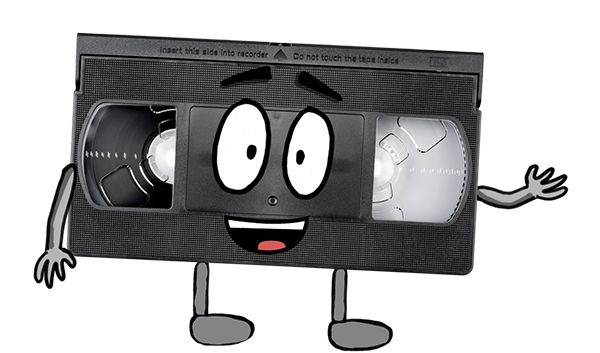Hi, I’m Vince the VHS tape. I was born in 1976, so I’m getting old and worn out, but I still have a lot of good stuff inside me—birthdays, high school football games, graduations, and weddings. In this video, I’m going to tell you three reasons why you need to digitize your magnetic tapes. Stick around and I’ll tell you more!
Number one: magnetic tapes slowly lose signal over time.
A video recorder uses a spinning head with an electromagnet to record the video and audio signals. The head spins at about 30 revolutions per second while the tape moves past it at just over an inch per second. As it spins, the record head magnetizes the coating on the plastic tape. Playback heads can then read that magnetic signal and convert it to video and sound your TV can show. It’s an impressive technology when you consider all the mechanical and electrical coordination required. The downside is that any magnetic field can influence the charge on the tape. A very strong magnet can instantly erase a tape—Radio Shack even used to sell tape erasers—while weaker magnetic fields slowly degrade recordings. Even the Earth’s magnetic field, the one that makes compasses work, gradually erases magnetic tapes. Most experts agree that the typical lifetime of a VHS tape is about 15 to 25 years, and powerful magnets inside TVs, stereo speakers, and electric motors can shorten that even further.
Number two: the machines required to play back magnetic tapes are going away.
Even if your tape’s signal is still strong, you may have trouble finding a working machine to play it. The last VHS VCR was manufactured in 2016, and other formats—like MiniDV, Video8, and especially Betamax—were discontinued long before that. The parts and expertise needed to maintain these machines are disappearing, too. Remember that complicated dance of a spinning head and moving tape? Everything has to be precisely aligned, and as belts wear out and capacitors leak, the odds of finding a fully functional VCR keep dropping.
Number three: you can watch and share your memories.
Right now your tapes may be sitting in a box or on a shelf, slowly losing signal. You might not even have a machine to play them. The content is likely still there, just inaccessible. The experts at Delaware Digital Video Factory can play back and digitize your tapes, cleaning and repairing them as necessary. Your audiovisual content can be archived on DVD, and digital files can be delivered on a USB drive. That lets you keep multiple copies in multiple places—give family members DVDs or USBs, and back up the digital files on external hard drives or a cloud service. Your one copy on one tape suddenly becomes many copies in different places that everyone can enjoy.

